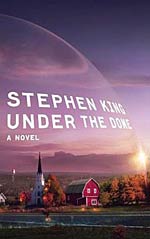
![]() verkisto
verkisto
7/26/2016
![]()
Glance at this novel in a bookstore, and you'll notice that there's nothing -- NOTHING -- on the book that indicates what it's about, other than the title and the cover. There are no notes on the dustjacket, no blurbs on the back cover, and for a change, the author's name is the same size as the title of the book. That probably says a lot about how Stephen King could publish his grocery list and still get a million people to buy it. In other words, the man has gone from being an author to being a commodity. I'm not sure if I'm appalled or jealous; regardless, I bought a copy myself.
The other thing that came to mind about this book, after I started reading it, was, "Wasn't this the premise of The Simpsons Movie?" I mean, isn't it just a little sad when the man who wrote such classics as It and Misery writes a book that's uncomfortably close to The Simpsons Movie? Sure, the afterword notes that the idea came to him decades ago, and yes, Stephen King isn't such a hack of a writer that the result is an unreadable mess (this is, after all, the man who wrote The-goddamned-Shining), but one might stop and rethink the novel overall if it looked like it was going to borrow heavily from a movie based on a weekly animated cartoon.
And that's sort of the weirdest thing about this novel: It relies almost completely on the reader accepting that a transparent, impenetrable dome settles itself over a town, cutting it off from the rest of the world. It's a very odd premise, which makes it difficult to accept. Yes, I realize how ridiculous that sounds, considering that King also came up with the idea of a possessed automobile and a haunted bathroom stall, among other things, but somehow those ideas didn't seem as far-fetched as this one. Still, like "The Metamorphosis" and its bug-transformation idea, once you accept that one, incredible premise, the rest of the story falls into place.
Now, the rest of the story becomes this weird mix of "The Monsters Are Due on Maple Street" and Lord of the Flies, but it never quite reaches the heights of either of those stories. Part of the reason, I think, is that he spends an incredible amount of time writing about the minutiae of what's happening. In some cases, this is very necessary -- he deftly shows how normal, average, rational-thinking people can turn into a rioting mob -- but for the most part, I was ready for King to just get on with it.
Another aspect of the book that bugged me was the characters. I get that a lot of authors only have a stock set of characters that they use from novel to novel, but I guess when you're embarking on an author's 50th novel, it becomes more apparent. If nothing else, the "psychic children" element of his novels grows very tiresome. Besides that, though, I reached a point where I just couldn't believe in the characters. The good guys were fine, but the bad guys strained credibility. The underling antagonists were more believable -- there are a lot of people out there who are willing to do terrible things, so long as someone else tells them to -- but the main antagonist just seemed too bad, too evil. The story is essentially one man's attempt at a power grab when his community is cut off from the rest of the world, and I found it a little ridiculous the lengths he would go to in order to keep it. Maybe I'm naive, or maybe it's just that I've never met someone who would be so duplicitous and conniving just to maintain personal power, but it just didn't ring true for me. I felt more frustrated over the events than anything else.
That feeling, though -- my frustration -- is important because it reminds me that King can still tell a good story. I've never argued this fact. Duma Key and Lisey's Story were both terrible tales, but they were told well, and I sort of feel the same about Under the Dome, mainly because he was able to elicit that emotion from me. The unfairness and machinations of the story kept me involved, at least to see what was going to happen in the end. As I told a friend of mine while reading this book, "I'm morally opposed to taking life, so I know an author is doing something right when he gets me to start rooting for the bad guy to get killed when I'm only 100 pages into the book."
Like a lot of recent King novels, I feel like the story is worth reading, purely for King's storytelling style, but the underlying story just wasn't very good. When he gets back to being able to do both well at the same time, I'll have found my next favorite Stephen King book.